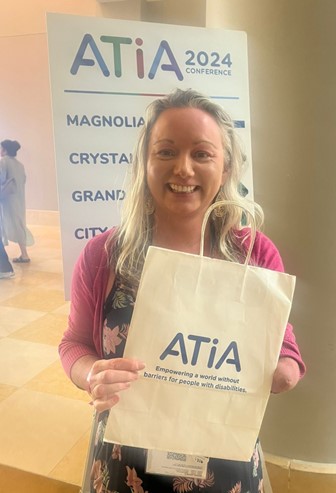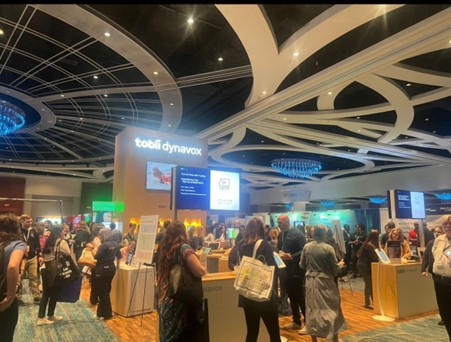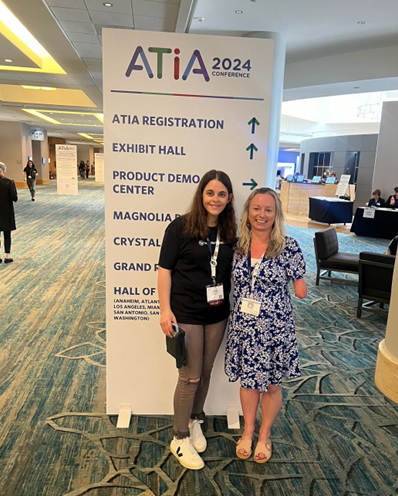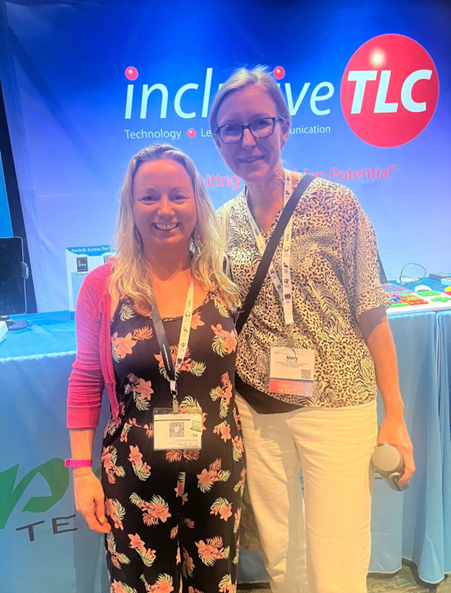Mary Lavender, Speech and Language Therapist and Chair of Disabled Staff Network in Cumbria, Northumberland Tyne and Wear (CNTW) NHS Trust.
As a local Speech and Language Therapist working with children and young people with Learning Disabilities, Augmentative and Alternative Communication (AAC) has been a key part of my job. I have always advocated for AAC to be high up on any professional’s agenda working with children and young people who have communication needs. ATIA solidified this thought and heightened my awareness of the extensive range of Assistive, Accessible Technology and software (ATech) available, which many professionals, families, and children may not be aware of. I returned from ATIA with a passion to normalise the use of ATech, spread awareness and ensure it is on agendas in places where it currently might not be.
I attended ATIA with my various hats on as: a disabled person myself (Autistic and Limb Difference), a mum to neurodivergent sons, a Speech and Language Therapist, and chair of Disabled Staff Network in my NHS Trust. It was an incredible experience, hopefully one day I will attend again. The theme of ATIA, “Empowering a world without barriers for disabled people,” resonates deeply with my passion for removing barriers to help disabled people thrive.

I was overwhelmed with how many sessions, the number of delegates, the many technology companies in the Exhibition Hall at ATIA. I met some incredible people and tech companies, I’m extremely grateful I was an AT Scholar of 2024.
I went to a session by Mary Giunta from Ed Tech Solutions. She shared on a working plan for AAC implementation. The working plan integrates many key frameworks and models within AAC, such as the SETT framework, Aided Language Stimulation, Janice Light Areas of competencies, Participation model and others. The working plan document is personalised according to the individual AAC user and their communication partners. It documents what the individual has achieved so all communication partners know this, what the individual is working towards, and what the communication partners are modelling without expectation. Everyone becomes part of the plan. The plan also addresses the needs of the communication partners, providing them with the necessary support to assist the AAC user.
Another remarkable AAC tool I learned about was Stepping Into AAC created by Carole Zangari, Rachel Langley, Tabi Jones-Wohleber, Michaela Ball and Kirsta Hadeed Larson. The program supports individuals and their communication partners in the AAC journey. It is an excellent resource for parents and education staff. I encourage you to spread the word about this program. “Stepping Into AAC” introduces Communication Partners to AAC, guides them through using new AAC tools and strategies and offers resources to engage school teams and parents/carers. The program is divided into 20 parts with activities, resources and videos, all available for free. I was amazed at how much work has gone into this toolkit.
It was great to have a deep dive session into the new version of the DAGG-3, (Dynamic AAC Goals Grid). It is available for free and can be used for any individual using any AAC system. It is helpful for any professionals or parents, wanting to choose and track AAC goals for an individual. The DAGG-3 is useful for setting and tracking AAC goals for individuals at any age and communication level. DAGG – 3 can help in real natural contexts and supports teamwork.
Amanda Hartman from AssistiveWare shared about new perspectives and support for AAC users. She shared on reframing our narrative about behaviours we might witness. She gave the great quote from Dr Ross Greene “Kids do well if they can”. She challenged the audience thinking. She encouraged the audience to demonstrate/model language associated with feelings, the problems, the interoception of body signals. She stressed the importance of “power words”, self advocacy language, and reevaluating visual tools to ensure they promote interaction and communication rather than compliance.
I went to a session given by Bethany Diener where she reminded us to prioritise the importance of joy in our communication interactions, as sometimes we focus so much on linguistic competency rather than social competency and joy.
Great to see the other main AAC companies who I work with in the UK having exhibition stands at ATIA: Tobii Dynavox UK, Smartbox, and Liberator. The conference also highlighted the importance of Access and computer access for many of the individuals we work with. As a Speech and Language Therapist it made me realise, we need to not just think about AAC but also advocate for computer access, as having these skills and solutions mean individuals can access the world more.

I loved learning more about IT solutions which are not just purely about AAC, but are important to help disabled individuals in our everyday life, whether at home, gaming, in education, in employment. Scanning Pens HelpKidzLearn, Pretorian, Inclusive Technology, TextHelp, Ayoa, MatchWare, Aventido.
Just a couple of months prior to ATIA I came across a mouth pad from Augmental, I signed up to be an early adopter if possible. I’m someone with an upper limb difference on my left side. The overuse of my right hand can cause me extreme pain in my body. You should have seen how excited I was when I noticed Augmental had a stand at the ATIA exhibition. It was great to meet the team and see them demonstrate it for me. The MouthPad is a tongue driven interface that controls a computer, smartphone or tablet. It is positioned on the roof your mouth, and you use your tongue to control it. I don’t think it is available in the UK yet, but hopefully we won’t have to wait too long.
The conference also showcased technology for individuals with vision loss or visual impairments from companies like Humanware, Dolphin, Inclusive Technology, OrCam. The sessions on AAC for individuals with CVI were particularly impactful, emphasizing the importance of providing robust AAC systems.
I was impressed how much the mainstream global technology companies are doing in the field of Assistive Technology and are increasingly prioritising digital accessibility. Apple and Google were two of the main sponsors of ATIA. Great to have experience learning more about Apple Accessibility , and Google Accessibility.
My highlight of the whole conference was having a personal meeting with Jordyn Zimmerman. In her ATIA session she shared on the importance of real disability inclusion, accepting and respecting difference, how there is not one way to play or learn, how robust AAC is key for so many nonspeaking, minimal speaking or part time AAC users. Jordyn did not get a robust AAC system until she was 18 years old. We need to do more so this shocking, yet powerful story is not repeated: See Us. Hear Us. – Jordyn Zimmerman. If you haven’t watched her “This is not about Me” video, try to encourage your organisation to buy it and show it to people who do not yet know the power of Assistive Technology This Is Not About Me | A story about growing up non-speaking.
It was great to have the opportunity to have a long chat with Jordyn on a variety of topics, ableism, disability rights and disability inclusion, plus the important subject of going down the water slide in the ATIA hotel! I also requested that I would love to do something with her in the future, and one day invite her to the UK, hopefully we can make this a reality.

I felt right at home at ATIA, surrounded by people who are passionate to make a difference and bridge the disability divide, so disabled people do not get left behind. Obviously one of these bridges is Assistive Technology, but other bridges which kept on coming was about creating positive change, recognising and tackling ableism, advocating for disability rights and upholding of human rights. One of my favourite quotes, made by Maya Angelou, came up in a few sessions:
“Do the best you can until you know better. Then when you know better, do better.”
This encapsulates my takeaway from the conference. We must do better at spreading awareness of Assistive and Accessible Tech, which is essential for so many disabled people. Whether it is for someone to communicate, to help in their education and accessing curriculum, to play games, to participate, to read, to join in, to support in employment, in heath care and social care solutions, in our society. So many people are currently missing out because it is not high up on agendas, but it needs to be. It shouldn’t be seen a “nice to have” or an extra but an essential and a must. Let’s normalise the use of Assistive Technology!

I would like to thank Martin Littler and others who gave me the opportunity to go to ATIA through the British Assistive Technology Scholarship fund. I loved every minute of it. A huge thank you to Karina and Nigel Wallace from Inclusive TLC, and Tina Voizey from Ace Centre who looked after me so well while I was there. Plus, Dave Gilbert and Bob Sagoo from Pretorian Technologies. I would also like to thank Mary Long, my co-AT Scholar, it was great to share the ATIA experience and dance floor with her on the ATIA celebration social evening!
Since coming back to the UK after ATIA, I’ve had the opportunity to spread the word of the importance of Assistive Technology both within my NHS organisation, at the Houses of Commons, and other events and meetings. I’m currently leading on a Digital Accessibility and Disability Inclusion project in my NHS organisation. I’ve also had the opportunity to invite some of the Technology companies to various meetings I lead and I’m part of. I’m eager to continue spreading awareness of ATech, as many people who could benefit are still unaware of it. Please contact me if you can assist in this endeavour. I value my time as an AT Scholar and will continue to advocate for Assistive Technology for disabled people.
For more information about the AT Scholar program and how to apply please visit acecentre.org.uk/at-scholar
Questions about the program or for Mary Lavender can be sent to [email protected].
